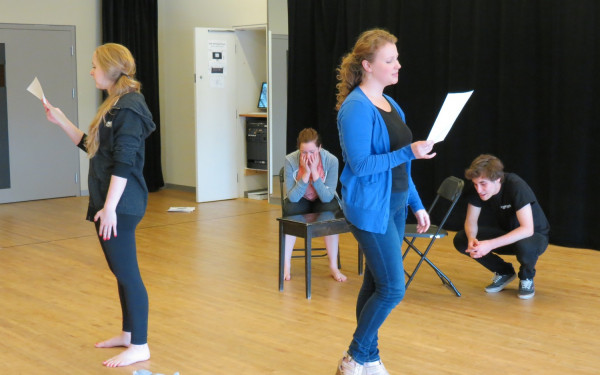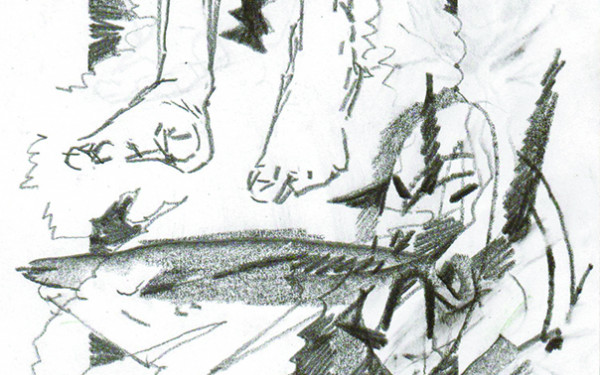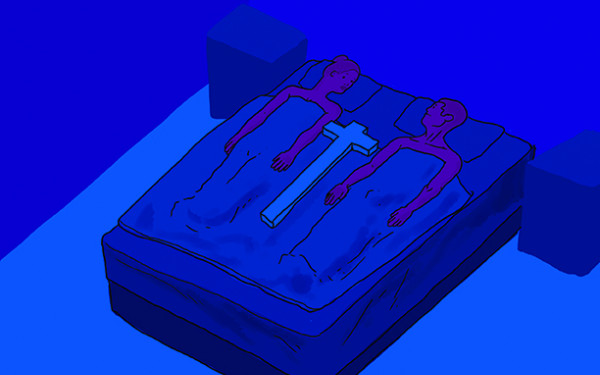Let’s Parler Religion
Concordia group brings the only bilingual theatre group to the Montreal Fringe Festival.
This year’s Montreal Fringe Festival is in full swing and is, as always, full of new and exciting plays from all over the world. Joining them this year is EMUNAH, a theatre piece created collectively by H-Dubbs Productions, an all Concordia theatre group.
Somewhat unconventionally, the actors in EMUNAH had the special opportunity to build their show from the bottom up.
“We wrote it as a group,” explained director Alyssa Harms-Wiebe. “Each actor has essentially written their own story and then, me being a playwriting major at Concordia, I’ve taken the liberty to edit and piece together and create a scene order with them. But they have individually written their monologues.”
Harms-Wiebe said the stories of the five actors are primarily based on their own experiences, although many layers were added and changes made in order to tell the story they wanted.
According to her, the show is a look at religion and spirituality in the 21st century told through the experiences of five storylines. Many discussions on religion in pop culture lean one way or another, either supporting it as an essential part of life or demonizing it as a hindrance to progress. But EMUNAH does not claim to reveal answers or to make any kind of point. It only seeks to explore religion, spirituality and its place in our contemporary lives and acknowledge it as an important social topic.
For actor Jonathan MacDonald, his character’s storyline is one of personal struggle.
“Ben, he wants to believe [in God] really badly and he grew up very religious in a Roman Catholic family,” he said. “But what we see is a moment in his life dealing with a very intense struggle in being accepted by what he wants to be accepted by. It’s a fight that he’s putting up but it’s out of love.”
Since the stories being told throughout the show stem from the actors’ real-life knowledge and experience, the cast is made up of people that come from many different religious backgrounds. Such diversity made the creation of the play into a learning experience for everyone involved.
“We entered into this project really open and ready to listen to each other’s stories and work together,” said Harms-Wiebe. “We’ve had tons of discussions about what people think of this, what people think of that, but even when people disagree I’ve never felt any tension at any point. It was more like, ‘Okay, I disagree but I want to hear your story too so I can understand where you’re coming from.’”
“Having that diversity in the room while going through this was so necessary because you have to be critical when you present something on stage,” MacDonald added. “So having those different viewpoints helped to ask the questions that might have been forgotten.”
But it wasn’t just other religions and experiences that the cast was able to learn about. Such in-depth conversation and exploration allowed each of the members to learn deeper truths, even about things they thought they already knew. According to MacDonald, digging deeper into their own beliefs made them move past the topic’s common tropes and clichés.
“Our characters were very stringent, originally, in their beliefs,” he said. “They were all very particular and almost a bit stereotypical. It was either ‘I am this religion and I am staunch with this’ or ‘I am an atheist and I don’t believe in this’.
“They were very much label based characters but in the end, and I think this is what makes the show so complex, there are so many doubts and concerns and questions that these characters have and these actors have created for themselves dealing with this topic,” he continued. “Now the characters feel much more authentic. The questions piled up and now the characters are much different, but better.”
“Because we wanted to create something that is Montreal, or a snippet of Montreal, we decided to do it in both languages.”
EMUNAH is special in more ways than just its take on religion and spirituality. It is also the only bilingual theatre piece in this year’s Fringe Festival.
“Because we wanted to create something that is Montreal, or a snippet of Montreal, we decided to do it in both languages,” Harms-Wiebe said. “One of the characters in it is francophone in real life and all his monologues are delivered in French.”
Along with other French snippets peppered throughout the anglophone story lines, the play also features sections of French Creole. But the decision to include both French and English in the play came from more than a desire to represent Montreal authentically. It was also about representing the characters authentically, and that meant allowing them write and act in language in which they could truly express themselves.
“At first [one of the actors] was delivering his pieces in English and then we brought up the idea of doing his pieces in French,” said Harms-Wiebe. “There was just so much more soul to his story as soon as he changed languages.”
But monolingual play-goers should not be worried about being left out of the story. The cast worked to also express the ideas in integrated, visual ways.
“One of the guys in the show, Fred, is also an acrobatics/circus instructor so we’ve included a lot of movement pieces,” said Harms-Wiebe. “There are a few people who have dance backgrounds so, it’s not a dance show, but we’ve included a lot of imagery through their physicality and their relationships with each other through the space.”
Already receiving positive attention after the first two days of the Fringe Festival, EMUNAH certainly raises some questions. However it will also encourage audience members to explore questions of their own. As they should, the ideas born during the play are sure to stick far past curtain call.
“Theatre is very present, you are physically there and so is the other person and that moment together is powerful” said MacDonald. “The way that this was written and the seed it was started from, was that we wanted to make a piece of theatre that could be projected on and interpreted in countless different ways by the audience.”
EMUNAH is currently playing at the Montreal Fringe Festival and will be remounted in September at the Loyola Chapel.
EMUNAH // June 13th 6 p.m., June 14th 12 p.m., June 15th 9:45 p.m., June 18th 8 p.m., June 21st 8:45 p.m., June 22nd 3:45 p.m. // Venue 12: Studio Jean-Valcourt (4750 Henri-Julien Ave.) // Students $8, Regular $10






